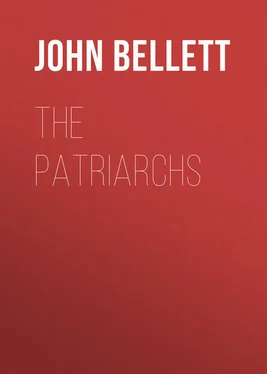John Bellett - The Patriarchs
Здесь есть возможность читать онлайн «John Bellett - The Patriarchs» — ознакомительный отрывок электронной книги совершенно бесплатно, а после прочтения отрывка купить полную версию. В некоторых случаях можно слушать аудио, скачать через торрент в формате fb2 и присутствует краткое содержание. Жанр: foreign_antique, foreign_prose, Биографии и Мемуары, на английском языке. Описание произведения, (предисловие) а так же отзывы посетителей доступны на портале библиотеки ЛибКат.
- Название:The Patriarchs
- Автор:
- Жанр:
- Год:неизвестен
- ISBN:нет данных
- Рейтинг книги:4 / 5. Голосов: 1
-
Избранное:Добавить в избранное
- Отзывы:
-
Ваша оценка:
- 80
- 1
- 2
- 3
- 4
- 5
The Patriarchs: краткое содержание, описание и аннотация
Предлагаем к чтению аннотацию, описание, краткое содержание или предисловие (зависит от того, что написал сам автор книги «The Patriarchs»). Если вы не нашли необходимую информацию о книге — напишите в комментариях, мы постараемся отыскать её.
The Patriarchs — читать онлайн ознакомительный отрывок
Ниже представлен текст книги, разбитый по страницам. Система сохранения места последней прочитанной страницы, позволяет с удобством читать онлайн бесплатно книгу «The Patriarchs», без необходимости каждый раз заново искать на чём Вы остановились. Поставьте закладку, и сможете в любой момент перейти на страницу, на которой закончили чтение.
Интервал:
Закладка:
We have to distinguish between these two things: God's assertion of His title to the earth, and God's call of a people out of the earth .
These different things have been again and again exhibited in the progress of the dispensations. And they have been exhibited, as I have long judged, alternately.
The Lord began, in Adam, to claim and display His rights on the earth. The man in the garden was to own the sovereignty of God, and the earth was the rest and the delight of the Lord, and the place of His glory.
Sin entering and polluting all, and the pollution being left uncleansed, in Seth God called a people away from the earth to an inheritance in heaven.
Then in Noah the Lord God re-asserted His rights here, and took up the earth as the place where His elect might find a home, and His own presence be known again.
After this Abraham is separated from kindred, and from country, and from father's house, to be a heavenly stranger on the earth, with his altar and his tent, looking for a city whose builder and maker was God.
Israel, in their day, then take up this mystic tale of the heavens and the earth, and in the land of Canaan become the witness of the scene of God's sovereignty. The ark passes over the river as "the ark of the covenant of the Lord of all the earth."
And now the Church is set for the full testimony of heavenly mysteries again; and strangership here is the divine idea, till our being taken to meet the Lord in the air.
This wondrous tale these dispensations of God, like day and night alternate, have thus been telling from the beginning; and still are telling. And millennial days ere long will make these pledges good, and be the glorious substance of these foreshadowings. 3 3 Such passages as Eph. i. 10 and Col. i. 20 tell us that both the heavens and the earth are equally the scene of divine purposes. And the great argument in Rom. xi. instructs us about those purposes, and the ways and times of their accomplishment.
Now let me observe, that whenever God arises in this progress of His counsels to assert title to the earth , He begins by judging and cleansing it. And this, I may say, of course ; because, the scene of His purposed glory and presence being corrupted, He must take the offence away, for His presence could not brook defilement. Noah's lordship of the earth was, accordingly, preceded by the flood carrying away the world of the ungodly. Israel's inheritance of Canaan under Jehovah, as the God of all the earth, was prepared by the judgment of the Amorites and the sword of Joshua. And the future millennial kingdom, when the earth is to be the place of the glory again, is (as all Scripture tells us) to be ushered in by that great action called "the day of the Lord," with a clearing out of all that offend, and all that do iniquity.
But the call of God is quite of another character. It proceeds on the principle, that God Himself is apart from the earth, and is not seeking to have it as the home of His glory, or the place of His presence; but seeking a people out of it, to be His, away from it, and above it. The earth is altogether a stranger to such a purpose. It is left just as it is found. No judgment, no visitation of the scene here from the hand of God, accompanies it.
This was exhibited in Abraham. Abraham was the object of the call of God; and accordingly the Canaanites find no rival in him. He does not dispute with them the title or possession of the soil. He finds them, and he leaves them, lords of it. He desires only to pitch his tent and raise his altar on the surface of it for a season; and then, for another season, to have his bones laid in the bowels of it.
So with the Church in this age. She is likewise under the call of God. But her call leaves the Gentiles in power, as it found them. "Let every soul be subject to the higher powers." The saints have only to obey them unreluctantly, or to suffer from them patiently, according as the demand made by them is or is not consistent with their subjection to Christ and the call of God. They cannot strive with the potsherds of the earth. Peter's sword is to be put up, and Pilate is to learn that the servants of Jesus cannot fight. Their warfare is not with flesh and blood. They are defeated the moment they begin it. The call of God has marshalled the hosts of God against principalities and powers on high, and the battle is there. It does not connect us with the earth. Our necessities do, but not our call . We need the fruit of the ground, the toil of the hand, and the skill of the heart, to provide things needful for the body. Our necessities thus connect us with it, and we have to do with it for their supply; but our call separates us from it. Joshua went into the possession of the Gentiles, that his sword might make it the possession of the Lord; Paul went into the places of the Gentiles, to take out of them a people unto God, linked with the disallowed Stone, despised and rejected of men.
The family of Seth were, in like manner, under this call of God. It was intimated to them by the charge to leave the blood of Abel unavenged, and they understood the intimation. If the earth be left in its defilement, God is not seeking it (as we have now seen all His ways declare), and this family of faith are in that secret. They will not seek it either. Cain's house was in possession of it, and Seth's family will leave them there, without a rival or a struggle. The mind of God in them took this knowledge of the way of God, and of His pleasure touching them; and they acted on heavenly principles in a blood-stained earth, whose judgment was now for a time to linger and to slumber.
I own, beloved, that I greatly admire this fine expression of the mind of Christ in these earliest saints. They take the only way which the holiness of God could sanction. They are "partakers of His holiness." The light they walked in was God's ; the holiness they partook of was God's . 1 John i. 7; Heb. xii. 10. This is a peculiar thing. That light is not merely righteousness. It is the light of grace also. Yea, and the light of heavenly strangership in a polluted world. It is a light which reproves the course of this world, and makes manifest other principles and hopes altogether. There may be righteousness, and the watching and praying which escapes temptation; but there must be a walk according to these principles and hopes, to form a walk "in the light, as He is the light." These earliest believers beautifully shine there, I believe. They were not under law. They come between Adam and Moses. They had not precepts, as I have already shown. But they were in the light, as God is in the light. And if afterwards Abram did not need to be told to have his altar and his tent-if he needed no precept from the Lord how to order the marriage of his son, or how to answer the king of Sodom-so these saints of still earlier days understood the holiness of the call of God, and took their journey for a heavenly country at the bidding of the pollution of the earth.
I own indeed, again, that I greatly admire this. It is the beauty of the Spirit's workmanship in His elect vessels. All is His. "How great is His goodness, and how great is His beauty!" They learn the word in spirit ere the voice of the Spirit uttered it-"Arise, depart, for this is not your rest; it is polluted."
The details about these antediluvian believers are very scanty; but through it all there is this heavenly character. They do not supply history for the world; but they do supply instruction for the Church. This is heavenly. No spirit of burning or spirit of judgment had purged the blood of the earth, and they shrink instinctively from it. In the spirit of their minds they leave it. "What communion has light with darkness? what fellowship has righteousness with unrighteousness?" their conduct asks. Their religion is that of separation from the world, and so are their habits .
Читать дальшеИнтервал:
Закладка:
Похожие книги на «The Patriarchs»
Представляем Вашему вниманию похожие книги на «The Patriarchs» списком для выбора. Мы отобрали схожую по названию и смыслу литературу в надежде предоставить читателям больше вариантов отыскать новые, интересные, ещё непрочитанные произведения.
Обсуждение, отзывы о книге «The Patriarchs» и просто собственные мнения читателей. Оставьте ваши комментарии, напишите, что Вы думаете о произведении, его смысле или главных героях. Укажите что конкретно понравилось, а что нет, и почему Вы так считаете.












